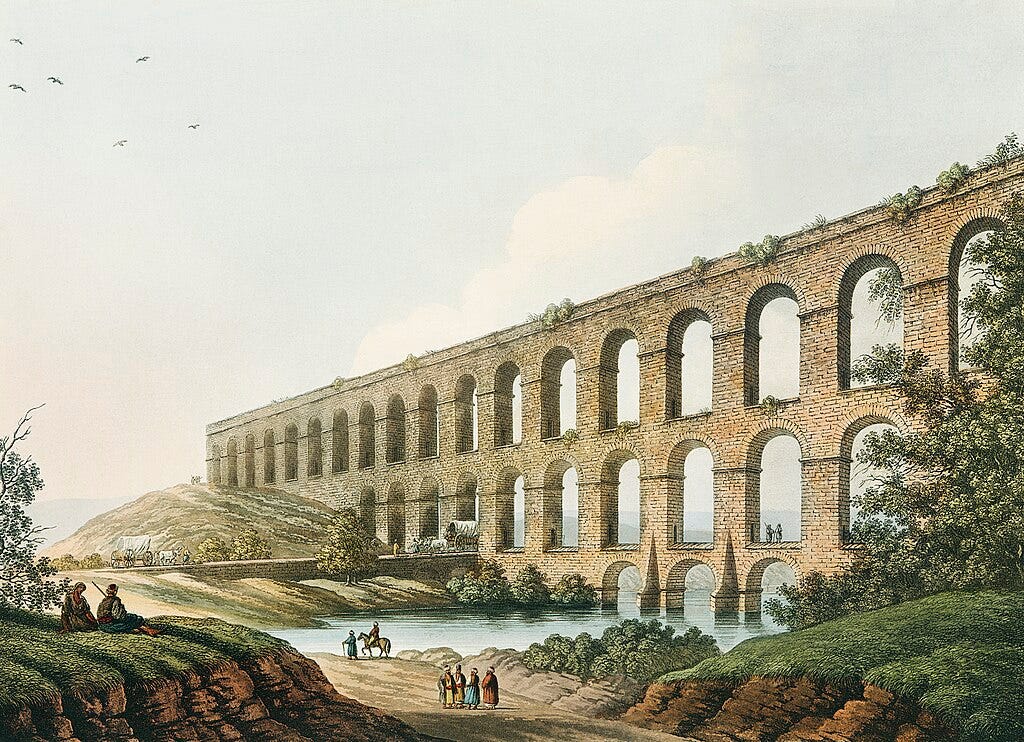This poem was inspired in part by reading Guy de la Bédoyère’s recent book Populus, which looks at the everyday life of ancient Romans. Bédoyère’s book is well-researched. In this excerpt, he draws on a technical treatise by Sextus Julius Frontinus, De aquaeductu, from the 1st century AD.
There were teams of imperial slaves known as aquarii (watermen) allocated to maintaining the aqueducts outside Rome and other teams who looked after the installations within the city as they brought the water down into private houses of the rich, public fountains, and the baths. One gang which was inherited from the Republic numbered 240 slaves, the other had 460 and was created under Claudius, both made up of specialist trades. Until reforms were brought in under Nerva they were being constantly diverted to private work for profit. Their costs were covered by rentals of water rights, which included their wages (commoda), showing that although they were slaves, they did receive an income.
The aqueducts required not only constant maintenance, but also measurement of flow rates and quantities. The Aqua Claudia produced the strongest flow but that, of course, made it also the most susceptible to wear and tear. There were other problems. The flow was reduced by water being taken off through legitimate grants for private use. When Frontinus ordered an inspection, he found that around 28 per cent were being siphoned off illegally with other inconsistencies caused by fraud in the way the flow was measured. Frontinus found theft going on from other aqueducts.
The line “Get it how you live” comes from a segment from Andrew Callaghan’s Channel 5, where he set up a confessional booth for people to spontaneously confess their secrets. One drunken passerby admits to having run PPP scams in multiple states, laughing with stuporous shame as he remarks “you gotta get it how you live.” That line stuck with me, and now it’s in here.
Capo the Aquari
You gotta get it how you live. Feel me?
The Claudii, they’re about these things.
The only difference between us is a name.
They made it work for them. Appius said
every man’s the maker of his destiny.
I bought me free from the watermen
working the Anio and the Claudian.
Roughshod, dirty work feeding all those
pretty fonts. My gang was eighty strong.
Most are stuck still breaking their backs,
clearing channels, scraping mud from settlers.
I know all the castelli east of the Maggiore.
I know a header from a surge. I know
to tap the tuff without faulting the brick.
I can get you a calix with your name on it,
stamped, with paperwork and everything.
Clean water, and close by the mainspring.
Cheaper and cleaner than a consul can.
Ask Gaius Pico, who runs the inn outside
Tusculum. He would’ve paid two hundred
in fees just to renew the water lease.
For a few rounds with his she-wolves
beneath the fornices, I forged him one.
Now, o’course, that’s not the asking price!
I don’t want your daughters—the poppets—
though they’re quite nice. Wouldn’t they like
a pond with pretty mullet swimming in the back?
Or a shrine with a spout for the garden?
Or for the misses and yourself, a bath?
Lucius Celer has a frigidarium
on his estate. A beaut. I laid the pipework
for it. All lead, and dug. They’ll never find it.
Won’t be missed, either, I can tell you that.
The City’s got so much water from the tap
they hose the streets down as a matter of fact.
The Claudii don’t bother with public baths.
Should you or I deserve any less?
Look,
there’s the law they nail up to forum walls—
spells out neat and proper how things ought
to get done—then there’s the law of custom.
One’s a story that gets told, the other’s true.
A fool listens to the story, but a clever man
hears the truth: you gotta get it how you live.
They were just fine to have me break my back
till I couldn’t lay down at night to sleep.
They lapped my tears from the lion’s pearly lips.
They waded in my sweat and took a piss
and blathered on and on about their politics.
And all that’s fine with me. They can talk
each other’s ears off, and make their laws
and post them in the forums, and hang them
from the guildkeeper’s door—they’ve got
a hardon for laws, they’re always making more—
I’ll give a gracious nod as I pass them by,
respect, but I’ll be over here getting mine.
They won’t tell me what it’s like today.
Me and the Claudii, we’re the same.
We both make our own way.
No?
Not interested? Not even a quote? Friend!
O that’s rich! A man out of time. A Brutus,
a Cincinnatus. Citizen, I commend you.
But some advice, and take it if you like—
you’re not good cause you follow the law
if the law itself is no good. Why suffer
the oppressor’s wrong, why find a rock
and offer up your liver for the crows
to feast on, and make honor into chains,
if they would just as well prefer it that way?
Integrity, restraint, they’ve no currency.
There’s only one inviolate law: you gotta
get it how you live, believe you me.





Roman history is the perfect ignition for your imagination. I enjoy the literary illusions, too--the ones I recognize (I'm sure there are plenty I don't). I'm guessing you're working your way to a new book, based on your readings in Roman history? I hope so.
Convincing voice throughout. And its that a little Hamlet I detect? ;-)
"Why suffer / the oppressor’s wrong..."